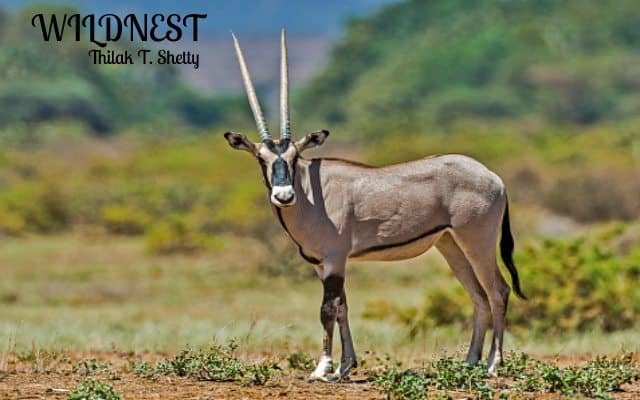The Arabian oryx or white oryx is a medium-sized antelope with a distinct shoulder bump, long, straight horns, and a tufted tail. It is a bovid, and the smallest member of the genus Oryx, native to desert and steppe areas of the Arabian Peninsula.
An Arabian oryx stands about 1 m high at the shoulder and weighs around 70 kg. Its coat is an almost luminous white, the undersides and legs are brown, and black stripes occur where the head meets the neck, on the forehead, on the nose, and going from the horn down across the eye to the mouth. Both sexes have long, straight or slightly curved, ringed horns which are 50 to 75 cm long.
Oryxes rest during the heat of the day. They can detect rainfall and move towards it, meaning they have huge ranges; a herd in Oman can range over 3,000 km. Packs are of mixed sex and usually contain between two and 15 animals, though herds of up to 100 have been reported. Arabian oryxes are generally not aggressive toward one another, which allows herds to exist peacefully for some time.
Historically, the Arabian oryx probably ranged throughout most of the Middle East. During the 19th and early 20th centuries, their range was pushed back towards Saudi Arabia, and by 1914, only a few survived outside that country. The diets of the Arabian oryx consist mainly of grasses, but they eat a large variety of vegetation, including buds, herbs, fruit, tubers and roots. Herds of Arabian oryxes follow infrequent rains to eat the new plants that grow afterwards. They can go for several weeks without water.
When the Arabian oryx is not wandering its habitat or eating, it digs shallow depressions in the soft ground under shrubs or trees for resting. They can detect rainfall from a distance and follow in the direction of fresh plant growth. The number of individuals in a herd can vary greatly (up to 100 have been reported occasionally), but the average is 10 or fewer individuals. Bachelor herds do not occur, and single territorial males are rare. Herds establish a straightforward hierarchy that involves all females and males above the age of about seven months. Arabian oryxes tend to maintain visual contact with other herd members, with subordinate males taking positions between the main body of the herd and the outlying females. If separated, males will search areas where the herd last visited, settling into a solitary existence until the herd’s return. Where water and grazing conditions permit, male Arabian oryxes establish territories. Bachelor males are solitary. A dominance hierarchy is created within the herd by posturing displays, which avoid the danger of serious injury their long, sharp horns could potentially inflict. Males and females use their horns to defend the sparse territorial resources against interlopers.
In June 2011, the Arabian oryx was relisted as vulnerable by the IUCN Red List.
The Arabian oryx is the national animal of Jordan, Oman, the United Arab Emirates, Bahrain, and Qatar.
The Arabian oryx is also the namesake of several businesses on the Arabian Peninsula, notably Al Maha Airways and Al Maha Petroleum.
In the King James Version of the Bible, the word re’em is translated as ‘unicorn’. In Modern Hebrew, the name re’em laban, meaning white oryx, is used in error for the scimitar-horned oryxes living in the sanctuary Yotvata Hai Bar near Eilat.The scimitar oryx is called re’em Sahara. The Arabian name ri’ïm is the equivalent of the Hebrew name re’em, also meaning white oryx, suggesting a borrowing from the Early Modern Era.
A Qatari oryx named “Orry” was chosen as the official games mascot for the 2006 Asian Games in Doha and is shown on tailfins of planes belonging to Middle Eastern airline Qatar Airways.

















